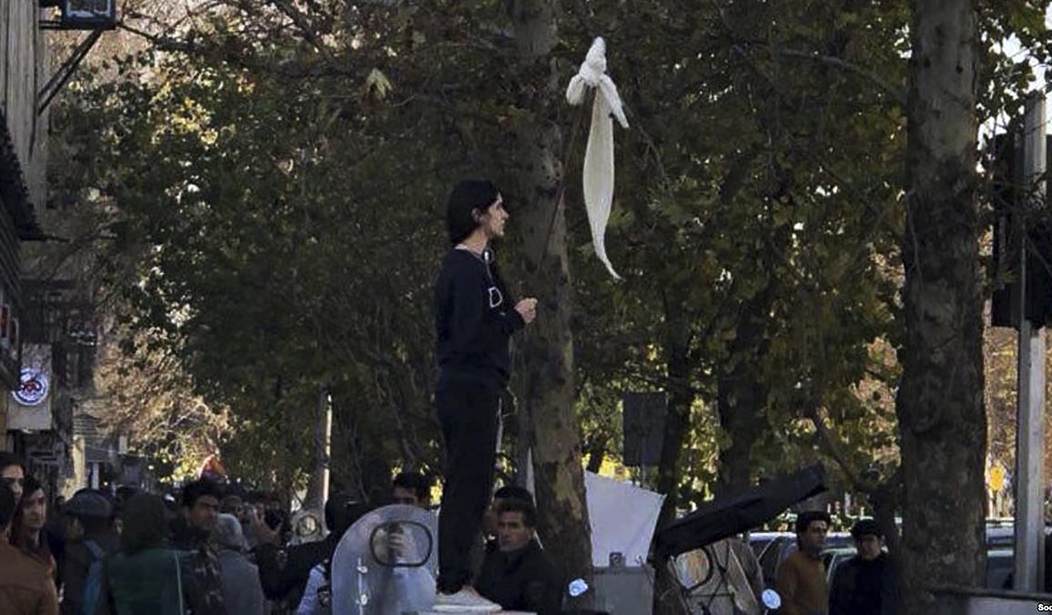The brave women in Iran who inspired the world and became the face of a revolution by removing their face veils in protest to the theocratic government are now being beaten, tortured, and charged with “inciting prostitution” in Iranian prisons.
Iranian police sent an official warning about the penalties for removing the hijab. Women who travel and spend time in public places without a hijab would be charged with a lesser crime carrying a penalty of one to two months in prison which could be reduced to a lower sentence. Encouraging other women to remove their veils would carry a heavier penalty, however. This offense would put a woman in jeopardy of one to ten years in prison and could not be converted into a substitute penalty. This criminal charge, “inciting corruption and prostitution,” is not only dangerous but demeaning.
Two women arrested for protesting the hijab have been already been informed that they face charges of “inciting corruption and prostitution” for their protest. Narges Hosseini was put on trial last week before an Ershad (Moral Guidance) court in Tehran on this charge. Shaparak Shajarizadeh, who is being held in solitary confinement in a prison near Tehran, faces the same charge.
In addition to facing the prostitution charge, Shajarizadeh has also been subjected to torture and beatings, according to her lawyer. She was also injected with an identified substance several times by force against her will.
“This is a deeply retrograde move by the Iranian authorities in their ongoing persecution of women who dare to speak out against compulsory veiling,” Magdalena Mughrabi, Amnesty International’s deputy director for the Middle East and North Africa, said in a statement. “It places many women at serious and immediate risk of unjust imprisonment while sending a chilling message to others to keep quiet while their rights are being violated.”
Vida Movahed and Azam Jangravi, two other women arrested for peaceful protests against compulsory veiling, are currently out on bail. Maryam Shariatmadari and Hamraz Sadeghi remain in detention.
According to Amnesty International, police have become increasingly brutal in their crackdown on the forced hijab. Women who take off their headscarves in public and wave them on the end of a stick have been beaten and gruffly treated by authorities.
Last Thursday, another hijab protester’s video went viral on Persian social media. Shariatmadari stood atop a concrete structure waving her hijab, but a police officer recklessly pushed her off. Her friends have reported that the fall resulted in injuries requiring surgery, but the woman is being held in prison without access to adequate medical care.
Shariatmadari’s mother, Mitra Jamshidzadeh, was arrested last Friday for about 30 hours. Her lawyer told Amnesty International that she was subjected to beatings after asking about her daughter’s whereabouts.
On Saturday, Sadeghi was standing atop a utility box in Tehran, waving her headscarf. She was beaten and arrested by a plainclothes officer. An eyewitness reported that her elbow was fractured after the policeman violently pushed her off the box.
Amnesty International also reported that Iranian authorities such as the Chief Prosecutor of Iran and the Head of the revolutionary Court in Tehran have insulted the anti-hijab protesters calling them “morons,” “infantile,” “deceived,” “perverted,” and “wicked.” They have also accused them of being in league with “foreign enemies.”
“The Iranian authorities must hold law enforcement officials to account for human rights violations, including torture and other ill-treatment and refrain from making any statements that incite further violence and abuse,” said Mughrabi, the Amnesty International spokeswoman.
Late last year, protesters took to the streets of Tehran and other Iranian cities, demanding less foreign policy involvement in the Middle East, freedom from the forced hijab, and even the overthrow of the regime. President Trump stood up for the protesters, in a sharp turn from Obama’s non-intervention in the 2009 Green Revolution.
On December 27, a woman later identified as 31-year-old Via Movahed became an international sensation after she stood atop a telecoms box in Tehran’s Enghelab Street. Enghelab means “Revolution” in Farsi.
While the protests seem to have dissipated, women kept removing their face veils in protest of the compulsory hijab through January and February. Analysts have warned that the regime’s time is limited. Police brutality against women protesting the forced hijab may stoke resentment, and help sustain the revolution.









Join the conversation as a VIP Member